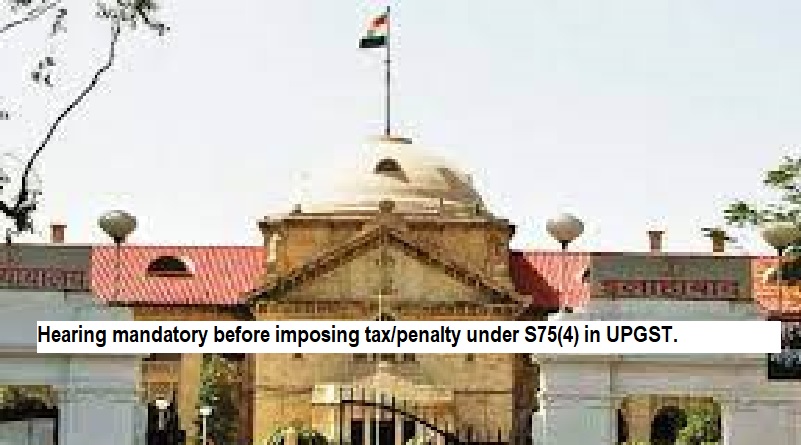


The Lucknow Bench of the Allahabad High Court recently rendered a significant decision, emphasizing the imperative nature of providing an opportunity for a hearing before the imposition of taxes or penalties under Section 75(4) of the Uttar Pradesh Goods and Service Tax (UPGST) Act, 2017. The case in question, M/S Primeone Work Force Pvt. Ltd. Thru. Its Auth. Signatory Alok Kumar v. Union Of India Thru. Secy. Ministry Of Finance (Deptt. Of Revenue) New Delhi And Others [WRIT TAX No. - 4 of 2024], sheds light on the procedural intricacies surrounding the imposition of tax and penalty, particularly when a technical glitch complicates the process.
Section 75(4) of the UPGST Act lays down a crucial provision, stipulating that an opportunity of hearing must be granted to the concerned party if it is requested in writing or if any adverse action, such as the imposition of tax or penalty, is contemplated against them. This statutory provision underscores the importance of procedural fairness and due process in tax-related matters.
In the case at hand, the petitioner found themselves in a predicament when show cause notices were issued, prompting them to explain why tax and penalty should not be imposed. In response, the petitioner submitted a detailed reply to the show cause notice. However, an inadvertent mistake occurred when the petitioner mistakenly marked "NO" for the opportunity of hearing. This error, as argued by the petitioner's counsel, was attributed to a technical glitch or mistake on the portal.
The crux of the petitioner's argument rested on the interpretation of Section 75(4), which mandates that an opportunity of hearing be provided when an adverse decision is contemplated against the party. The petitioner's counsel contended that the orders, imposing tax and penalty, were passed a day before the scheduled date. Additionally, reliance was placed on the precedent set by the Allahabad High Court in cases like M/s. Mohini Traders vs. State of U.P. and another and Bharat Mint & Allied Chemicals Vs. Commissioner, Commercial Tax & others.
The court carefully considered the circumstances and observed that since both tax and penalty were imposed against the petitioners, and an adverse decision was unequivocally contemplated, the department was obligated under Section 75(4) to afford the petitioners an opportunity of hearing. The court emphasized that merely marking the option as "NO" due to a technical glitch did not entitle the department to pass orders without providing a fair and proper opportunity for the petitioners to present their case.
Importantly, the court acknowledged the petitioner's contention regarding the timing of the orders, highlighting that the imposition occurred a day before the scheduled date. This discrepancy raised concerns about the procedural regularity and adherence to the prescribed timeline.
Consequently, the court exercised its judicial discretion and quashed the orders imposing tax and penalty. However, it granted the department the liberty to proceed afresh from the stage of providing a fair opportunity of hearing to the petitioner. This decision underscores the court's commitment to upholding principles of natural justice and procedural fairness in tax proceedings, even when faced with technical glitches or inadvertent errors on the part of the concerned parties.
In conclusion, the Allahabad High Court's decision in M/S Primeone Work Force Pvt. Ltd. v. Union Of India highlights the significance of complying with Section 75(4) of the UPGST Act, ensuring that parties facing potential adverse actions are accorded a proper opportunity of hearing. The court's nuanced approach in considering the technical glitch and the timing of the orders demonstrates a balanced and principled application of legal provisions to safeguard the rights of taxpayers in the realm of goods and service taxation.
TAGS: Allahabad High Court UPGST Act Section 75(4) Opportunity of Hearing Tax and Penalty Adverse Order Procedural Fairness Technical Glitch